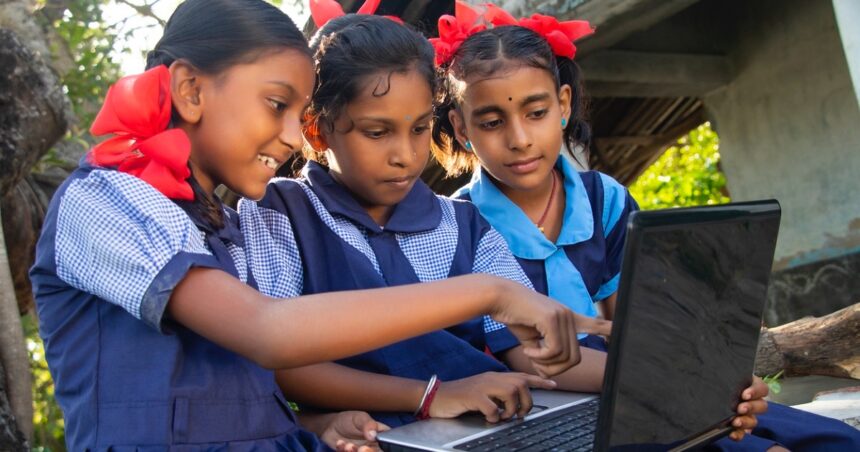The Indian education system is on the cusp of a technological revolution, and Artificial Intelligence (AI) is leading the charge. From personalized learning to automating administrative tasks, AI is transforming the way schools operate and students learn. But with this transformation comes a mix of excitement, skepticism, and challenges that are shaping the future of education in India.
AI: The Catalyst for Change in Indian Schools
1. Personalized Learning: Teaching Every Child Differently
Gone are the days of a one-size-fits-all approach. AI-powered platforms like Byju’s, Vedantu, and Toppr are offering personalized learning experiences tailored to individual students’ needs.
- Adaptive Learning Models: AI systems analyze students’ strengths, weaknesses, and learning paces, crafting customized lesson plans.
- Impact: A report by NITI Aayog highlighted that AI-led learning tools have improved retention rates by 22% in pilot programs across schools in Maharashtra and Tamil Nadu.
2. Bridging the Rural-Urban Divide
AI has the potential to democratize education by bringing quality resources to underprivileged and remote areas.
- Smart Classrooms: States like Karnataka and Andhra Pradesh are deploying AI-driven virtual classrooms to reach students in rural areas.
- Language Barriers: Tools like Google’s AI-powered translation services are helping students learn in their preferred languages, making education more inclusive.
3. Automating Administrative Tasks
From grading assignments to scheduling parent-teacher meetings, AI is reducing the administrative burden on teachers.
- Real-Life Example: Schools in Delhi NCR are using AI chatbots to handle student queries and streamline admissions, saving countless hours.
- Impact on Teachers: Freed from repetitive tasks, teachers can focus more on creative and interactive teaching methods.
Challenges: The Flip Side of AI in Education
1. Accessibility and Affordability
While AI tools are making education innovative, their high cost limits widespread adoption.
- Data Divide: According to a TRAI report, only 35% of rural India has reliable internet access, creating barriers for AI-enabled learning.
2. Data Privacy Concerns
AI tools often collect sensitive student data to provide personalized learning. But how safe is this data?
- Current Scenario: India lacks robust laws to regulate the use of AI in schools, raising concerns about data breaches and misuse.
3. Overdependence on Technology
AI tools, while innovative, risk making students overly reliant on technology, potentially hampering critical thinking and creativity.
The Government’s Role in Driving AI Adoption
1. Initiatives Underway
- The National Education Policy (NEP) 2020 emphasizes integrating AI and digital technologies into school curricula.
- Programs like PM eVIDYA aim to use AI to deliver high-quality digital content.
2. Future Prospects
- The government plans to introduce AI-based assessments under CBSE by 2025, moving away from rote learning to competency-based education.
AI in the Classroom: A Look at the Future
1. Smart Tutors and AI Avatars
AI-powered tutors are set to revolutionize how students receive assistance, offering 24/7 help. Imagine a student in a small village getting math lessons from a virtual teacher designed by India’s top educators.
2. Gamified Learning
Gamification, driven by AI, is making studies engaging and interactive. Schools in Mumbai and Bangalore are already piloting AI-based gamified apps to teach STEM subjects.
3. Predictive Analytics for Early Intervention
AI systems can predict which students are at risk of dropping out or underperforming, enabling schools to intervene early.
Breaking Myths Around AI in Education
1. “AI Will Replace Teachers”
Far from replacing teachers, AI serves as an enabler, helping educators focus on creativity and mentorship rather than mundane tasks.
2. “AI is Only for Elite Schools”
With government and private partnerships, AI tools are becoming more accessible, as seen in the Diksha app, which delivers AI-powered content for free.
Closing Thoughts: Redefining the Future of Learning
AI is not just a tool; it’s a transformative force reshaping the Indian education landscape. While challenges like accessibility and privacy persist, the potential benefits far outweigh the risks.
As AI continues to integrate into classrooms, the focus must remain on ensuring equitable access, ethical implementation, and a balance between technology and human touch. The future of education is not just digital—it’s smart, inclusive, and endlessly adaptive.
The question isn’t whether Indian schools are ready for AI; it’s whether we can harness it to bridge gaps and create opportunities for every student, everywhere. Are we prepared to embrace this shift?


Leave a Reply